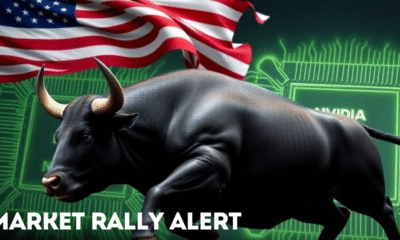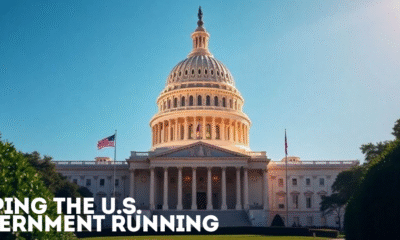Business
Wall Street Faces Turbulence as Trump’s Tariffs Trigger Market Chaos

In a dramatic turn of events, President Donald Trump’s recent tariffs have sent shockwaves through Wall Street, leading to a historic decline in stock prices, bonds, and the U.S. dollar. Investors are grappling with the implications of these sweeping trade measures, which have sparked fears of a global economic upheaval.
Key Takeaways
- Trump’s tariffs on Chinese goods reach up to 145%, prompting retaliatory measures from China.
- The Dow Jones Industrial Average plummeted nearly 1,000 points, marking a significant market downturn.
- Simultaneous declines in stocks, bonds, and the dollar raise concerns about investor confidence in the U.S.
Overview Of The Tariffs
On April 2, 2025, President Trump announced a series of tariffs aimed primarily at China, with rates soaring as high as 145% on certain goods. This aggressive stance is part of a broader strategy to protect American manufacturing and reduce the trade deficit. However, the immediate aftermath has been tumultuous, with global markets reacting negatively.
Market Reactions
The financial markets have experienced unprecedented volatility:
- Stock Market: The Dow Jones Industrial Average fell by over 2%, losing nearly 1,000 points in a single day.
- Bonds: U.S. government bonds, typically seen as safe havens, also saw a decline, which is unusual during market turmoil.
- Dollar: The U.S. dollar dropped to a three-year low against a basket of major currencies, indicating a loss of confidence among investors.
Investor Sentiment
The simultaneous decline in stocks, bonds, and the dollar is a rare occurrence, often seen in emerging markets rather than in the U.S. This has led to speculation about the underlying reasons:
- Loss of Trust: Investors may be losing faith in the U.S. financial system due to Trump’s unpredictable policies.
- Portfolio Adjustments: Many investors are re-evaluating their holdings in light of the tariffs, leading to widespread sell-offs.
- Global Economic Impact: The tariffs could potentially reshape the global economic landscape, prompting fears of a trade war.
Implications for the U.S. Economy
The ramifications of these tariffs extend beyond Wall Street:
- Consumer Prices: Economists predict that tariffs will lead to increased prices for a wide range of imported goods, affecting everyday consumers.
- Foreign Investment: A decline in foreign investor confidence could lead to higher borrowing costs for the U.S. government, complicating fiscal policies.
- Global Relations: The tariffs have strained relationships with key trading partners, including China, Canada, and Mexico, which could lead to retaliatory measures.
Conclusion
As the dust settles from Trump’s tariff announcements, the financial landscape remains uncertain. Investors are left to navigate a complex web of economic implications, with many questioning the long-term stability of the U.S. financial system. The coming weeks will be critical in determining whether confidence can be restored or if the markets will continue to face turbulence.
Sources
-

 Stock Market6 days ago
Stock Market6 days agoUS Stocks Soar as Court Blocks Trump Tariffs and Nvidia Delivers Strong Earnings
-

 Press Release6 days ago
Press Release6 days agoCV5 Capital Announces Standout Performance of Cryptanium Fund I SP, Beating Industry Benchmarks
-

 Government6 days ago
Government6 days agoCongress Passes Continuing Resolution, Averting Government Shutdown
-

 Government6 days ago
Government6 days agoExperts Warn of U.S. Slide Towards Authoritarianism Under Trump Administration
-

 Alternative Energy7 days ago
Alternative Energy7 days agoShalom Lamm on Rising Rent and the Future of Housing
-

 Business3 days ago
Business3 days agoS&P 500 Soars in Best May in Decades Amid Tariff Relief and Nvidia’s Surge
-

 Healthcare4 days ago
Healthcare4 days agoAttention Economy Arms Race: Reclaim Your Focus in a World Designed to Distract You
-

 Immigration3 days ago
Immigration3 days agoTrump’s Immigration Crackdown: Legal Battles and Policy Shifts










